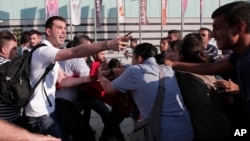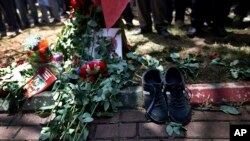Turkey briefly blocked access to Twitter Wednesday to prevent the distribution of photos of Monday's bombing in Suruc, in which at least 30 people died and dozens were wounded.
A Turkish government official said that access was restored after the company “removed malicious content, including hate speech, in line with the court order.”
The official spoke on condition of anonymity, because of restrictions imposed on officials speaking to the media.
Officials had said that Turkey had asked Twitter to remove 107 URLs, or Web address links, with images related to the bombing and the company removed 50 before the ban.
Watch related video: Kurdish anger erupts over suicide bombing
Earlier Wednesday, a court in Suruc issued a ban on the publication of images related to the bombing in the media, including on the Internet and on social networks, Anadolu news agency reported.
Bombing suspect
Meanwhile, Turkish authorities have confirmed that Monday's bombing was a suicide attack and identified the bomber as Seyh Abdurrahman Alagoz, a 20-year-old Turkish national.
The explosion targeted an activist group of mostly university students who were planning to travel across the nearby border to Syria to help rebuild the city of Kobani.
Turkish President Recep Tayyip Erdogan condemned the attack as an "act of terror."
The United States also strongly condemned the attack, calling it "heinous."
"We express our solidarity with the Turkish government and the Turkish people and reaffirm our undeterred resolve to the fight against the shared threat of terrorism," White House spokesman Josh Earnest said in a briefing with reporters.
Suruc is home to a huge camp for Syrian refugees fleeing violence in their country. Just across the border in Syria, Kobani has been the site of intense battles between Kurdish forces and Islamic State militants.
Earlier this month, activists said Kurdish fighters had driven out Islamic State fighters from Kobani after the jihadists took over several of the town's neighborhoods. Dozens of civilians were killed when IS militants launched that counter attack on Kobani.
Kurdish fighters, backed by U.S.-led coalition airstrikes, recaptured the contested town near the Turkish border early this year and have since been chipping away at IS control in other border areas.
VOA's Turkish Service contributed to this report.








